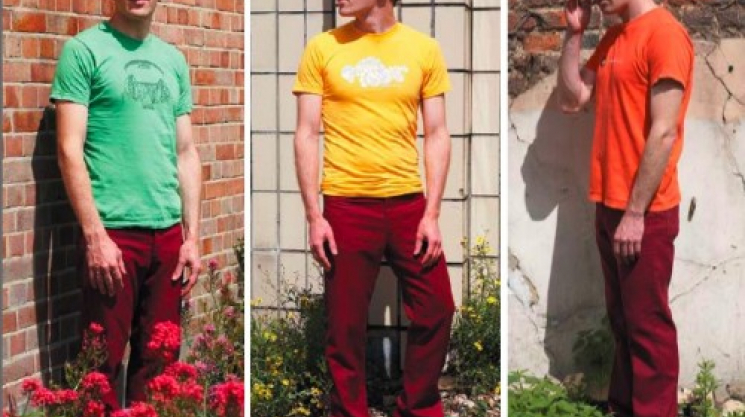
Fri, 08/10/2007 - 00:00 by AltaGrade
Creative process is a tricky thing. It’s different for everyone, but for most, there’s an element of escapism; of going to that “happy place” where everything just clicks. For Dan Snaith, aka Caribou, that happy place is Andorra.
Or at least, he thought it was. It turns out the tiny European country nestled between Spain and France that Snaith fantasized about while working on his fourth full-length record wasn’t all he’d imagined it to be. Instead of a romantic long-lost country in beautiful mountains, Snaith found what he describes as a giant duty-free store with guns, smokes and booze abound. He decided to name the record Andorra, anyway
.
“I’d already been working on the album, and before I got there I knew a lot of the songs on the record had that emotional, kind of romantic feel about them, they were really lush, and I was just imagining this would be the physical realization of the place I was going in my head to make that music and then it didn’t end up being that at all,” he says. “The title refers more to the place where I escaped to when I was making music in my head rather than the reality of the place. It’s kind of like this crappy room that I’m recording in and then the place that I go when I record.”
The lush, delicate songs of Andorra not only feel rooted in a different place, but also in a different time. With one notable exception—the epic closer “Niobe,” which has a Chemical Brothers-meets-Beta Band feel—Andorra’s songs are firmly rooted in the 60s, something Snaith says is the result of him shifting his focus on the record.
“The last record was more influenced by kind of droney music that doesn’t have so many chord changes and different harmonies. This one focused more on the melodies and actually writing songs. For me, the 60s ended up being the natural point of comparison for really good songwriting,” he says, citing examples like the Beach Boys and the Zombies. “I think that’s maybe what made me kind of go in that 60s kind of sound.”
When the Dundas, Ontario native released his first album, Start Breaking My Heart, in 2001 under the Manitoba moniker (which he was forced to abandon after threat of a lawsuit from Dictator’s singer Richard “Handsome Dick” Manitoba), Snaith was sounding more like Boards of Canada than the Beach Boys. But over the course of his next two records, Up In Flames and The Milk of Human Kindness, Caribou’s sound has slowly morphed from the electronic to the psychedelic. Snaith says another key difference on Andorra—Caribou’s first album on Merge Records—is the crafting of the songs was more intentional. “In the past, a lot of the music that I’ve made has been about happy accidents and coincidences where I’ve just tried something out,” he says. “This time, I was putting everything in exactly the place that I wanted it. It goes hand in hand with writing more composition, actually writing songs and planning arrangements out in advance.”
Andorra’s genesis also occurred when Snaith had a lot more free time on his hands. He’d moved to London to pursue his PhD in Mathematics in 2001 and after wrapping it up in 2005, this record marked the first time he’d only had his music to focus on.
“It was just a much longer and more intense process. It was the first time I hadn’t been doing two things in my life,” he says. “I started in January, 2006 and finished a little over a year later. It was six, maybe seven days a week working all day on it. I made like 600 and something tracks I started to varying degrees. . . That seems to be the way it works for me; spewing out as many ideas as I can and just getting the ideas down and then picking through them and seeing which ones work.”
This sounds like a project that would cost a small fortune in studio rental. Fortunately, Snaith is still recording the same way he has since day one; in a room in his London apartment. Booking a few weeks in a studio—the route your average band usually takes—is a totally foreign concept to him.
“There’s a reason that I’m spending so much time; it’s what I’ve always enjoyed doing since I was a teenager, constantly make music and enjoying that process,” he says. “I’ve just been recording and recording and recording, and the idea of just going in for two weeks and making an album in that short period of time is totally alien to me. It totally mystifies me how people do that.”
But perhaps a studio album is a future possibility for Caribou. After all, Snaith says he’s always up for a musical challenge, and has even deviated from his tradition of being the sole composer on his latest release. Andorra features a track co-written by the Junior Boys’ Jeremy Greenspan, a longtime friend of Snaith’s. While he was uncertain about collaborating at first, Snaith says “She’s the One” turned out for the best. “The thing I fear most is you’re working on something together and it’s not as good as it could be, but because we’re friends we’re just both being really polite and then having an end result that none of us are really happy with but neither of us are being honest about it. That just ended up not being the case at all,” he says. “We both totally felt comfortable saying, ‘I think this part should be changed,’ and we worked together really well, I thought, and the song has the best of both of us in it.”
Whether he’s changing his stage name, his hometown or his songwriting process, Snaith seems to be quite the musical enigma. Or maybe he’s just a math geek recording great music in his bedroom.




Add comment